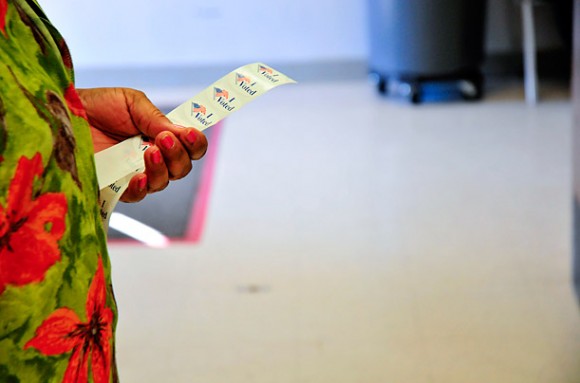Go Ahead: Throw Your Vote Away

When one urges support for third party or Independent candidates for elected office, the response from partisans of the Republican and Democratic parties is fairly predictable. Perhaps their most common retort is that if you cast your ballot for any third party or Independent candidate, you are “wasting your vote” and “throwing it away.”
But isn't the situation today the exact opposite?
In other words, the only wasted vote is a vote for a Democrat or a Republican. You could vote for the reproduction of the failed political status quo, for the continuing misrule of Republican-Democrat party government, or you could cast a meaningful ballot in favor of individuals who stand in opposition to business as usual in our local, state and federal government, who might reasonably be expected to put the people's interests before those of their party and their corporate sponsors.
The other day, IVN took a broad, quantitative view of this year's opposition third party and Independent candidates for governor, US Senate and US House in all 50 states. Today we'll take a closer look at the field of third party and Independent candidates running for US House, State Senate and State Assembly in California.
This year will be the first in which we witness how California voters take to the state's new top two style primary system. Under the top two primary, all candidates for a given office participate in the same primary election, regardless of their party affiliation, and all eligible voters may cast a ballot in that primary election, regardless of their party affiliation.
It is widely held that, because of its non-partisan character, the top two system will increase turnout among voters with no party affiliation. Individuals with no party affiliation now account for more than 21% of the state's registered voters.
Since only the top two vote-getters proceed to the general election under the top two primary system, voters who desire to see alternatives to the Democrats and Republicans on the general election ballot will have to support them in the primary. California's primary will be held on June 5th
As the most populous state in the Union, California has the largest delegation to the US House with 53 districts. This year, opposition candidates can be found on the primary ballot in 27 of those contests. Independents, candidates with “no party preference,” are leading the pack with 26 candidates in 21 districts. The Green Party follows with candidates in 6 races. The Libertarian party is running 3 individuals, and the Peace and Freedom Party has one candidate for US House. For the sake of comparison, consider that there is at least one third party or Independent candidate on the ballot in every single one of Texas's 36 congressional districts.
The situation is very different in California's state government. In the State Senate, there are actually more races in which there will only be one candidate on the ballot than there will be with a choice beyond the representatives of the two-party duopoly. Of the 20 seats up for election in the State Senate, there are alternative candidates in only 2 races, one Independent and one Libertarian, while there are three uncontested races in which there will only be one candidate on the primary election ballot.
All 80 seats in the State Assembly are, of course, up for election this year. There will be at least one third party or Independent candidate in just 14 of those races, including 9 Independents, 3 Greens, 2 Libertarians, and one Peace and Freedom Party candidate. There are 5 races in which there will only be one candidate on the primary ballot.
Do you prefer two-party misrule, or would you rather have legitimate representation?




